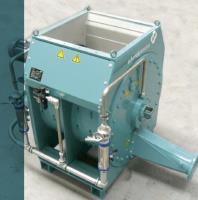 Add My Company
Add My Company
Sign In

High availability, low wear: Schenck Process broadens its portfolio of injection blow-through rotary valves for alternative fuels
The new IDMS 120 can significantly increase plant efficiency
Schenck Process, a world-leading producer of applied measurement and process technologies, is expanding its tried-and-tested portfolio of blow-through rotary valves. The new IDMS 120 injection blow-through rotary valve sets itself apart thanks to its wear-reduction concept and overload-protection system and offers an exceptional service life along with high availability.
The IDMS 120 (the 120 refers to the diameter of the rotary valve in centimetres) can be used, for example, for rotary kilns in the cement industry or fluidised bed furnaces in the power generation sector. Schenck Process developed the rotary valve specially to meet the pneumatic requirements created by the use of alternative fuels, including fibres, wood chippings and shredded plastics, to generate energy. A conveying blower uses air pressure to move fuel through a pipeline into the furnace. The basic requirement is to safely feed the material into the pipeline, which is under high pressure. The IDMS can feed fuel into a pipeline at pressures of up to 350 mbar.
“The extension of our IDMS range offered by the IDMS 120 allows us to address the market trend towards ever-increasing feed performance,” explains Harald Faber, who heads the German Application Development unit for alternative fuels at Schenck Process. “It is possible to double the feed capacity of an existing plant by equipping it with the new valve, without the need for costly pipeline or furnace upgrades.” The flexibility of pneumatic feeders also allows clients in the furnace technology industry to test the valve in different positions in order to determine the optimum feed point for a furnace and thereby decide on the best position in their existing systems.
The IDMS 120 also features a unique wear-reduction concept: “The blow-through rotary valve has a modular construction. All the essential housing components can be replaced. The wear strips at the edge of the rotary valve can be changed on location using simple tools, without the need for readjustment. Thanks to the hard seal gap between the rotary valve and its casing, the rate of wear is slow and steady. That makes it easier to control and precludes dramatic increases in air pressure loss due to leaks and the accompanying decrease in pneumatic performance,” Faber goes on to explain.
Schenck Process guarantees the safe functioning of the IDMS and high availability for one furnace campaign, a period of one year, assuming that the alternative fuel meets the specified requirements. Thanks to the TorqLoc® shaft-hub connection, the new drive system is protected from overloads: If the IDMS is blocked by contaminants or foreign bodies, the drive train will not be permanently damaged.
For more information on High availability, low wear: Schenck Process broadens its portfolio of injection blow-through rotary valves for alternative fuels talk to Clyde Process
Enquire Now
More News
List your company on FindTheNeedle.
